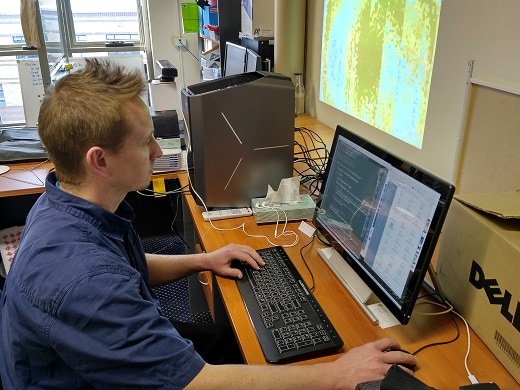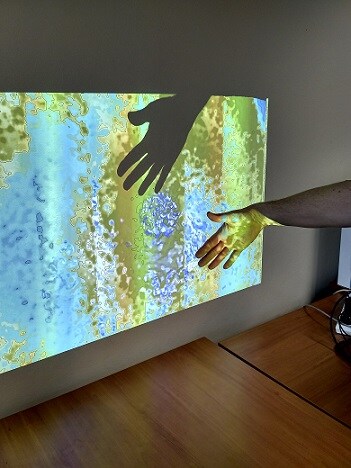The 2017 FEIT Education Innovation Grants are a FEIT EIU scheme to fund educational innovation, and educational quality improvement proposals for units of study, major or degree programs and other learning opportunities in line with the University Strategy 2016-2020.
FEIT EIU is currently funding four projects that commenced 1 March 2017 and will be completed by 28 February 2018:
Project One

Title: Bringing 4D Numerical Tools into the Classroom
Leader: Guien Miao
Team Members: Dr Benjy Marks, Prof David Airey, A/Prof Abbas El-Zein, A/Prof Thomas Hubble, Dr Samantha Clarke and Mr Tom Hartley.
Description:
The undergraduate experience in engineering aims to produce competent professional engineers through encouraging them to engage with realistic problems. Although students clamour for more ‘realism’ in their courses, looking at scenarios in more than one dimension requires significant resources which are often unfeasible. This project will provide a means for students to interact with realistic scenarios by introducing a new facility, and learning paradigm, into several undergraduate coursework subjects in civil engineering. We propose to construct an Augmented Reality Sandbox (ARS) which will be used as both the user interface and visualisation methods for existing numerical codes.
Students will create structures by hand using the sand in a physical sandbox, and the ARS will then use motion capture technology to identify the surface of the sand. This surface will be used to run a simulation, which will be handled in real-time with minimal user input. The simulation output will then be projected directly onto the sand. In this way, students will be able to rapidly iterate their design decisions, with constant visualisation of sophisticated numerical tools, without any prior programming knowledge. This will enable students to directly interact with problems that are both intellectually stimulating and physically realistic.
Project Two
Title: Towards an integrated Power Engineering curriculum using active learning
Leader: Archie Chapman
Team Members: Dr Gregor Verbic, Dr Ke Meng, Dr Swamidoss Sathiakumar and Dr Jin Ma.
Description:
The increasingly multi-disciplinary nature of the engineering profession calls for the integration of the curriculum to help students build connections between topics. In power engineering, the situation is further exacerbated by the transition towards future smart grids that requires expertise that sit outside of the core domain. In BE (Power) curricula instructors have found that students come to lectures unprepared to extend their knowledge. Remedying this consumes both time and the attention span of students. To counter this situation, this project will develop a suite of interactive computer-based demonstrations of key power engineering ideas and methods. Demonstrations pertinent to a unit’s content will be provided to students in advance of lectures, with the primary aim of engaging students in taking responsibility for their own pre-class preparation. By developing these demonstrations all at once, the coherence of teaching material across the BE (Power) will be improved. In addition, the project will produce a guide to developing further interactive demonstrations, so that it might be applied across other units in SEIE, FEIT and the University.
Project Three

Title: Dashboard to support student metacognitive processes
Leader: Judy Kay
Team Members: Prof Lynn Crawford, A/Prof Keith Willey, Prof Alan Fekete, Dr Philip Gough, Dr Danny Liu, Dr Micah Goldwater, A/Prof Bob Kummerfeld and Dr Ehssan Sakhaee.
Description:
This project aims to provide a new form of feedback to students during the semester so that they can better judge the potential implications of their progress.
The project will harness rich collections of learning data during the semester. This currently includes measures of learning progress, such as self-tests and assignments and includes measures of engagement, such as activity on discussion boards and activity on the LMS. Importantly, it can also include metacognitive and attitudinal measures, collected in online surveys.
Together, these will be used to create a student- and staff-facing dashboard. This aims to provide a new form of feedback to students, which supports their metacognitive processes of self-reflection, self-monitoring and planning their learning through the semester.
The project will build and evaluate a process that teachers use to create the dashboard which can then be made available to students. The process will enable the teacher to discover correlations between final grades and rich collections of data available through the semester.
Project Four
Title: Bringing PASTA to the Computer Science Education Community
Leader: Bryn Jeffries
Team Members: A/Prof Irena Koprinska, Dr Vincent Gramoli and A/Prof Kalina Yacef.
Description:
The PASTA system, for automated marking and feedback in computer programming assessment, represents a substantial investment of effort by many members of the School of Information Technologies over several years. Used successfully with over 5000 students and in 14 courses, it provides students with immediate automated feedback and helps teachers providing more insightful feedback to students and systematic marking. It has evolved in response to lessons learned over successive offerings of core units in the School.
In this project, we will address PASTA’s key shortcomings as they now stand. We will improve its usability and security, extend its support for multiple programming languages, and provide learning analytics tools for both students and teachers. Following these improvements, we will make PASTA available beyond the School, and work to foster a wider community of users and contributors.
